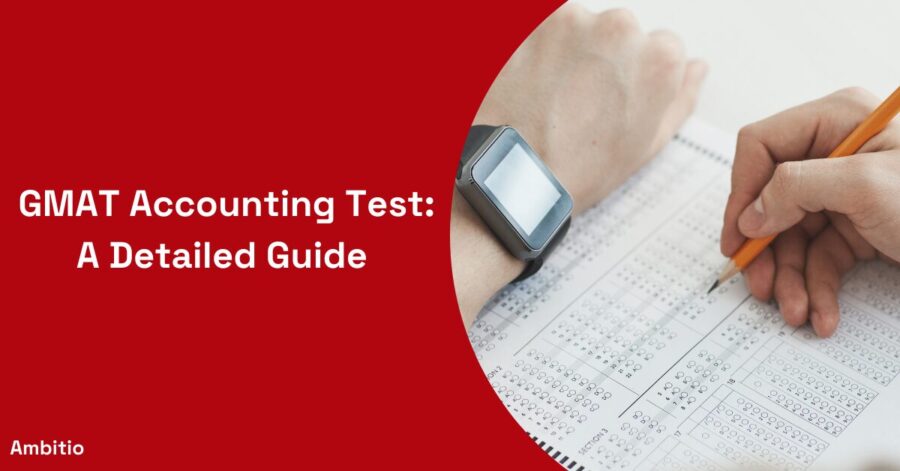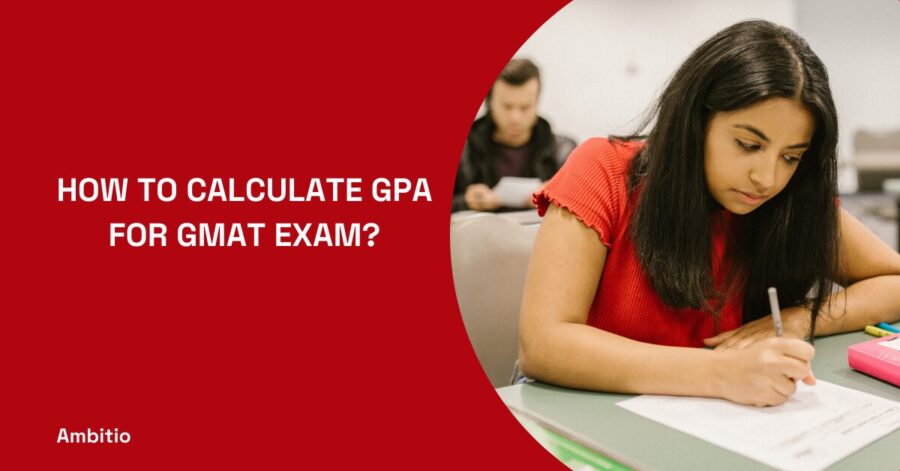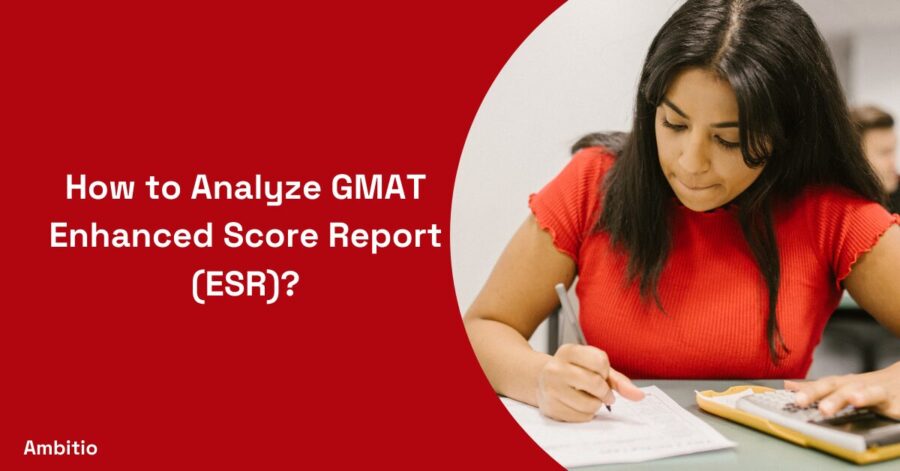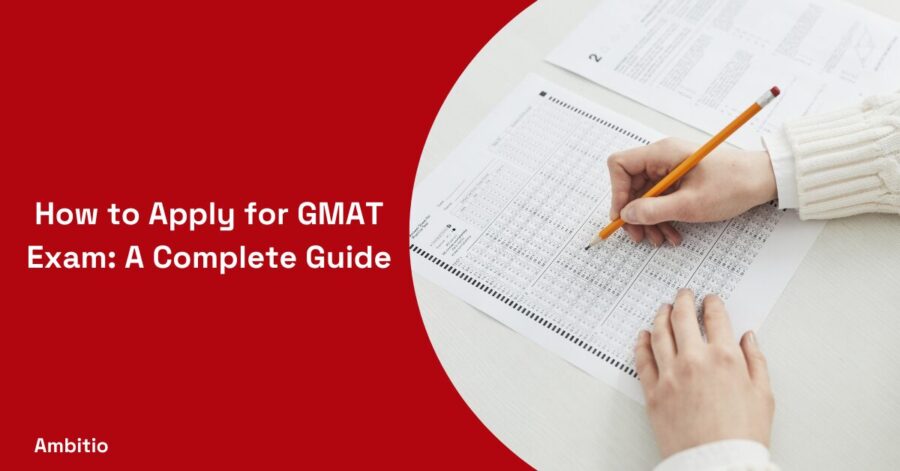11 December 2024
10 minutes read
GMAT Accounting Test: A Detailed Guide

Key Takeaways
- Scoring well on the GMAT is crucial for admission to top accounting programs, enhancing your application by demonstrating strong analytical and quantitative skills.
- The GMAT consists of four sections—Analytical Writing Assessment, Integrated Reasoning, Quantitative, and Verbal.
- Effective GMAT preparation involves studying practice questions, taking practice tests, and using various resources to understand the format and question types.
- Avoid common pitfalls such as poor time management, overlooking instructions, and neglecting weaker sections.
- Many prestigious accounting programs worldwide accept GMAT scores.
Are you considering a master’s degree in accounting and you feel that it is high time that you write the GMAT? The importance of GMAT score and its correlation with the admission to top accounting programs cannot be overstated, and therefore paying extra attention towards doing well in the examination is advised.
Cracking the GMAT is no child’s play, and needs serious focus and dedication from your part. In this easy-to-follow guide, you will learn all that needs to be said about the test itself, major concepts, approaches to preparation and more. The purpose of this guide is to give you all the tips and recommendations that can be helpful no matter if you’re just beginning your preparation and studying for the GMAT or if you want to brush up on your skills and get better results.
Do You Need To Take the GMAT for Accounting Master’s Programs?

It should be noted that GMAT remains a standard part of the criterion of entry for numerous amount of recognized master’s degrees in accounting. Prominent universities like the University of Texas at Austin, the University of Illinois at Urbana-Champaign and the University of Southern California tend to expect solid scores on the GMAT to assess the applicant’s preparation to handle quantitative accounting courses.
It is clear that a high GMAT score can only improve your application and illustrate your analytical and quantitative as well as the verbal ability that is crucial to the accounting discipline. Programmes that call for the GMAT are likely to be more structured and inclusive of more content areas and covers more accounting principles and practices. Finally, admission to such programs would afford the opportunity to gain better jobs, better pay and a strong base of alumni when one gets out to practice the noble profession.
What Does the GMAT Look Like?
The GMAT, or Graduate Management Admission Test, is a standardized exam used for admissions to MBA and other graduate management programs. The GMAT test is divided into four main sections:
- Analytical Writing Assessment
- Integrated Reasoning
- Quantitative
- Verbal
Each section is designed to measure different skills essential for success in graduate management education. The Analytical Writing Assessment requires you to write an essay, while the Integrated Reasoning section tests your ability to evaluate information presented in various formats. The Quantitative and Verbal sections consist of multiple-choice questions that assess your mathematical and language skills.
GMAT Scoring
The GMAT’s scoring system is comprehensive. The total GMAT score ranges from 200 to 800, with separate scores for each section. Scores are often presented in percentiles, indicating how you compare with other test-takers. This percentile ranking can be particularly useful for graduate management admission committees to assess your performance relative to other applicants. You need to use the right strategies to beat the GMAT and get ahead of the competition.
Test Center
To take the GMAT, you need to visit an authorized test center. These test centers are located worldwide, making it convenient for candidates to find a location near them. You can check the official GMAT website to locate a test center and schedule your exam.
Preparation
Preparation is key to succeeding in the GMAT. Effective test prep includes studying practice questions, taking practice tests, and reviewing test strategies. Numerous resources are available to help you prepare for the GMAT test, ensuring you understand the format and question types you’ll encounter. There is a best way to prepare for GMAT in 2 months and a best way to prepare for it with a GMAT 6 month study plan. But the key lies in how much effort you put into the process of preparation.
How much does it cost to register for the GMAT?
The cost to register for the GMAT is $275. When you take the exam, administered by the Graduate Management Admission Council (GMAC), you will be assessed on skills like algebra and critical thinking. After completing the test, you will receive unofficial scores before leaving the test center.
What is a ‘good’ GMAT score?
A ‘good’ GMAT score depends on your target GMAT score and the requirements of your desired programs. Generally, scoring above 700 is competitive for top programs. This standardized test evaluates your reasoning skills and problem-solving questions.
When you take a exam, you’ll face questions in this section that include multiple-choice problems with possible answers. To gain a better idea of the exam scores, it is essential to understand the GMAT minimum score accepted by universities, as well as the upper limit, which is the GMAT max score. The GMAT score is valid for five years, offering flexibility in your application timeline. Preparing with many GMAT practice tests, including easy questions, helps you familiarize yourself with the test format and improve your performance to achieve your target score.
Skill Areas
Now that you have a general idea of what a GMAT exam is and what a good score can do for your education, let us take a closer look at the various sections of the exam:
Quantitative
Quantitative Reasoning is designed to assess your ability to apply numerical concepts to evaluate situations or answer a problem through math computation. This section consists of two types of questions: Logical reasoning, on the other hand, comprises of two types of questions: quantitative comparison problem-solving questions where you are presented with a mathematical problem and asked to use your logic to solve; and data sufficiency questions which measure the ability of a candidate to determine if the given data is sufficient to solve a given problem. The data sufficiency GMAT section is also an important determinant of your score in the exam.
Verbal Section
Verbal Reasoning involve reading, ability to comprehend written text; analytic ability to judge the soundness of given arguments and language usage to edit the written material to fit the standard grammatical structures and language rules. This is a reading comprehension section, this is where they check your understanding and your ability to reason out things with the help of readings; critical reasoning and finally; the sentence correction where they evaluate your ability to correct grammatical errors if any in the certain sentence or passage. Core GMAT sections include maths and verbal, which always needs extra emphasis. The Verbal section is important to show how well you know the written English including your analytical skills. If you want to crack verbal for GMAT, you need to understand the question pattern and areas that need extra emphasis.
Integrated Reasoning Section
The Integrated Reasoning (IR) section tests your ability regarding the analysis of information provided in form and from different sources of origin or formatting. It includes four types of questions: Critique of graphics interpretation, two-part analysis, table analysis, and multi-source reasoning. They usually enable you to demonstrate your capacity to make informed decisions and engage with abstract problems, which is common in real-life business environments.
Analytical Writing Assessment
The Multiple-Source Reasoning section of the Analytical Writing Assessment (AWA) aims to evaluate your critical analysis and reasoning. But is AWA important for GMAT? Absolutely! As a task in this section, you are expected to write an essay aiming at the analysis of a given argument. As a student, your assignment is to assess a specific argument and evaluate the reasoning behind it, highlighting the logical fallacies and interpretation of the presented information. This portion is focused on your capacity to analyze, as well as having a coherent and concise writing style. Mastering AWA GMAT is not an easy feat, but you can definitely ace it with practice.
Common Pitfalls and How to Avoid Them on Test Day

Avoiding the following common pitfalls by thorough preparation and strategic practice will help you score well on the GMAT. Whether it’s your first attempt or you plan to retake the GMAT, understanding these challenges and how to overcome them is key to achieving your desired score, which helps you in breaking the GMAT 700 barrier.
Lack of Time Management
On the day of the exam, many accounting students struggle with managing their time effectively, which can lead to incomplete sections and a lower overall score. To score well on the exam, practice pacing yourself during each section of the GMAT. Use a timer when doing a practice exam to get accustomed to the time constraints.
Overlooking Instructions
In the stress of the real exam, it’s easy to overlook instructions. Carefully read the instructions for each problem-solving, data sufficiency, and critical reasoning question to avoid simple mistakes. Make sure you understand what each question is asking before you start answering.
Weakness in Specific Sections
Identifying and addressing your strengths and weaknesses is crucial. Accounting students often excel in the Quant section due to their background but may neglect the Verbal section. Studying for the GMAT should involve a balanced approach, focusing on both quant and verbal sections to ensure a high overall score.
Insufficient Practice
Relying solely on studying materials without taking practice exams can be detrimental. Regularly take the test under simulated conditions to familiarize yourself with the actual GMAT environment. This practice helps in reducing anxiety and improving performance on the day of the exam. With the right practice, you can even score 800 in GMAT test.
Ignoring Test Format
The format of the GMAT is different from other exams like the CPA exam. Familiarize yourself with the unique question types such as data sufficiency and critical reasoning. Understanding the structure and types of questions in each section of the GMAT will help you navigate the test more efficiently.
Stress and Fatigue
Test day stress and fatigue can impair performance. Ensure you are well-rested and have a clear mind on the day of the exam. Regular breaks and a healthy routine leading up to the exam can help in maintaining focus during the real exam. Keep you necessary documents ready before the time of the exam, like the GMAT admit card so that you do not forget it last minute.
Misjudging Retake Strategy
If you don’t perform well, remember you can retake the GMAT once every 16 days. Use your experience from the first attempt to identify areas for improvement. Analyze your performance in problem-solving, data sufficiency, and critical reasoning sections to strengthen your approach for the next attempt.
At-Home Study Methods to join the GMAT Club

Studying at home for the GMAT can be highly effective if you use the right methods and resources. The GMAT, a test used for admission to graduate business programs, requires a comprehensive study plan to master the different sections of the exam. Here are some at-home study methods to help you join the GMAT club and excel on exam day:
Structured Study Schedule
Since the GMAT is a timed test that lasts three and a half hours, it’s essential to create a structured study schedule. Allocate specific times for each section of the exam, ensuring you cover the verbal and quantitative sections, the analytical writing section, and integrated reasoning. You can go for a 45 day GMAT study plan if you have over a month left to take the exam.
Practice Timed Tests
Regularly take timed tests to simulate the actual exam conditions. This helps you manage your time effectively and get accustomed to the pressure of completing the test within the allotted time. Mastering GMAT time is crucial to determining your success.
Self-Paced Learning
Utilize self-paced learning materials that allow you to study at your own speed. Focus on problem solving questions and questions based on data sufficiency, as these are crucial for the quantitative section.
Analyze Practice Questions
Practice reading and interpreting complex texts, as this skill is essential for both the verbal section and the analytical writing section. Pay attention to how you approach problem solving questions and data sufficiency questions. For example, if you want to be an absolute master in this section, you need to practice at least 1000 GMAT critical reasoning questions. At the end of the day, practice makes perfect.
Identify Strengths and Weaknesses
Take practice tests to identify your strengths and weaknesses. This helps you target areas that need improvement and allocate your study time more effectively.
Review Incorrect Answer Choices
After completing practice questions, review all incorrect answer choices to understand where you went wrong. This helps in refining your test-taking strategies and avoiding similar mistakes on exam day.
Utilize Online Resources
Join online forums and study groups, such as the GMAT Club, to share tips and resources with other test-takers. These platforms often provide valuable insights and study materials that can aid in your preparation.
Adapt to Fewer Questions
Some practice resources may have fewer questions compared to the actual GMAT. Ensure you adjust your practice to include a comprehensive range of questions that reflect the full scope of the exam.
Simulate Real Exam Conditions
Since the GMAT is administered at test centers around the world, try to simulate these conditions at home. Find a quiet place, set a timer, and eliminate distractions to mimic the testing environment.
Top Accounting Colleges Across The Globe Accepting GMAT
These top accounting colleges across the globe accept the GMAT as part of their admissions process, emphasizing the importance of strong analytical and quantitative skills in their rigorous accounting programs. Preparing well for the GMAT can open doors to these prestigious institutions and set the stage for a successful career in accounting.
| University | Country | Program | Course Price (Approx.) | Average GMAT Score |
|---|---|---|---|---|
| The University of Texas at Austin (McCombs School of Business) | USA | Master in Professional Accounting (MPA) | $52,000 | 700 |
| The University of Illinois at Urbana-Champaign (Gies College of Business) | USA | Master of Accounting Science (MAS) | $44,000 | 680 |
| London School of Economics and Political Science (LSE) | UK | MSc Accounting and Finance | $50,000 | 700 |
| INSEAD | France/Singapore | Master in Finance | $80,000 | 710 |
| The University of Melbourne (Melbourne Business School) | Australia | Master of Accounting | $40,000 | 680 |
| University of Toronto (Rotman School of Management) | Canada | Master of Management & Professional Accounting (MMPA) | $70,000 | 680 |
| Hong Kong University of Science and Technology (HKUST Business School) | Hong Kong | Master of Science in Accounting | $35,000 | 650 |
| University of Sydney Business School | Australia | Master of Professional Accounting (MPAcc) | $50,000 | 670 |
| HEC Paris | France | Master in Management (MiM) – Accounting | $60,000 | 710 |
| Singapore Management University (SMU) | Singapore | Master of Professional Accounting (MPA) | $45,000 | 650 |
Conclusion
One would need to prepare for the GMAT in the same way that any person preparing to pursue a master’s degree in accounting at any global university would do. This GMAT accounting test overview offers all the pertinent data and requests for the students and other interested individuals. By considering these points, the overall quality of your application can be stepped up, thus also the analysis and quantitative abilities improved in addition to the probability to get enrolled into some of the world’s best accounting programs. Begin your improvement now and be on the right path to attaining the ideal profession in the field of accounting.
Master the GMAT and pave your way to excellence with Ambitio. Our platform offers in-depth study materials, practice questions, and tailored feedback, focusing on the areas you need to strengthen to boost your score and secure your place at a top accounting school.
FAQs
How long is the GMAT score valid?
GMAT scores are valid for five years.
Can I use a calculator on the GMAT?
Calculators are only allowed in the Integrated Reasoning section; they are not permitted in the Quantitative section.
How many times can I retake the GMAT?
You can take the GMAT up to five times in a rolling 12-month period, and a maximum of eight times in a lifetime.
What is the minimum GMAT score required for top accounting programs?
While requirements vary, competitive programs typically look for scores above 650, with top programs often expecting 700 or higher.
How should I prepare for the GMAT if I have a full-time job?
Create a structured study schedule, utilize self-paced learning materials, and take practice tests on weekends or during free time.
Is the GMAT the only test accepted for accounting master’s programs?
Some programs may accept the GRE as an alternative, but many top accounting programs prefer the GMAT. Check specific program requirements.

You can study at top universities worldwide!
Get expert tips and tricks to get into top universities with a free expert session.
Book Your Free 30-Minute Session Now! Book a call now




























